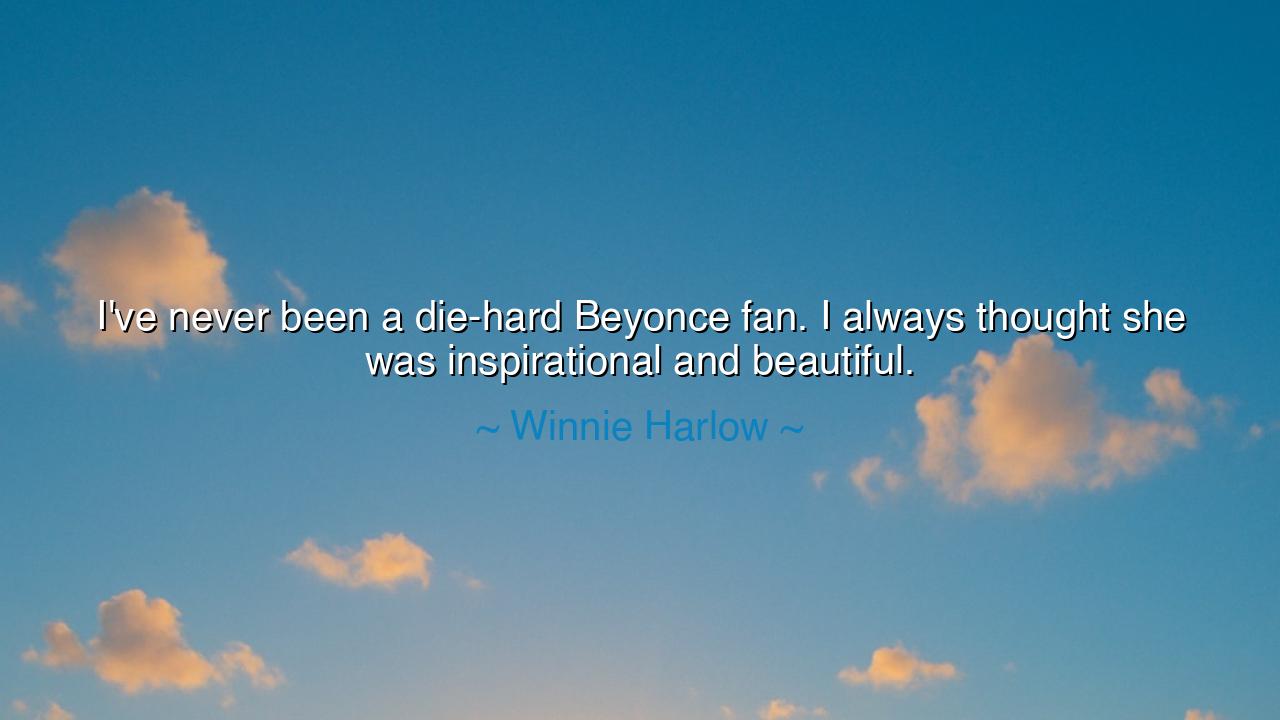
I've never been a die-hard Beyonce fan. I always thought she was
I've never been a die-hard Beyonce fan. I always thought she was inspirational and beautiful.






In the soft-spoken yet profound words of Winnie Harlow, there resides an honesty rare in a world that often demands excess in admiration: “I've never been a die-hard Beyoncé fan. I always thought she was inspirational and beautiful.” On the surface, it seems a simple admission — a statement of respect without devotion. Yet, within its calm balance lies an ancient truth: that true appreciation does not always require worship, and that one may honor greatness without surrendering one’s individuality. In this reflection, Harlow teaches us the virtue of discernment — to recognize beauty and inspiration without losing one’s own voice in the echo of another’s fame.
The meaning of her words reaches beyond music or celebrity. Harlow, a woman who has herself defied convention through her modeling and self-acceptance, speaks as one who has learned to admire others without imitation. In calling Beyoncé “inspirational and beautiful,” she acknowledges excellence — artistry, grace, power — while standing firm in her own identity. It is a lesson the ancients knew well: that reverence, when pure, strengthens the spirit rather than diminishes it. The student who admires the philosopher learns not to become him, but to awaken the philosopher within herself. The artist who studies the master does so not to mirror his strokes, but to find her own hand guided by understanding.
The origin of this wisdom lies in the timeless dance between humility and individuality. In the great academies of Greece, disciples were taught to admire their teachers deeply — yet also to question them. Aristotle revered his master Plato, but he dared to challenge him, saying, “Plato is dear to me, but dearer still is truth.” So too does Winnie Harlow, in her quiet way, embody this balance. She acknowledges Beyoncé’s greatness — her beauty, her inspiration — but she does not seek to lose herself in imitation. In doing so, she mirrors the wisdom of those who have learned that admiration should uplift, not overshadow.
There is also within her words a subtle humility. To admit one is not a “die-hard fan” is to speak with honesty in a culture that worships unthinking devotion. Harlow’s words remind us that love of art, or of any human creation, need not be blind to be sincere. The inspirational can still be imperfect; the beautiful can still be human. In recognizing this, she honors Beyoncé not as an idol, but as a person whose excellence shines precisely because it is real. And in that recognition, Harlow reveals her own strength — for only those who know their own worth can admire without envy.
Throughout history, there have been figures who admired greatness while remaining steadfast in their own essence. Consider Leonardo da Vinci, who studied the work of his predecessors with devotion, yet transformed art into something wholly new. Or Rosa Parks, who drew courage from the leaders before her, yet found within herself the quiet fire to act when the moment came. Such people understood what Winnie Harlow’s words quietly teach: that inspiration is not imitation, but ignition — a spark that lights one’s own path, not one that forces you to walk another’s.
Her reference to beauty carries a deeper resonance as well. For Harlow, whose own journey has redefined conventional ideas of beauty, to call another woman beautiful is no mere compliment — it is recognition. It is the acknowledgment that beauty, like music or art, wears many faces. In calling Beyoncé beautiful, she honors the divine in another without denying its reflection in herself. Thus, her statement becomes a dialogue between two forms of empowerment — one that sings on a stage, and one that walks in courage before a mirror.
The lesson that flows from her words is both humble and profound: learn to admire without surrendering your own voice. In every age, the temptation to idolize — to lose ourselves in others’ greatness — threatens to eclipse our own inner light. But the wise know that admiration should be a mirror, not a shadow. Let others inspire you, but let that inspiration awaken your own gifts. Honor beauty when you see it, but remember that your own form of beauty is no less sacred.
Therefore, let us take Harlow’s reflection as a teaching for our time: to see greatness clearly, and to celebrate it without forgetting ourselves. Be moved by others’ strength, but build your own. Find joy in another’s light, yet nurture your own flame. For the world does not need another Beyoncé or another Harlow — it needs you, inspired yet unimitated, humble yet whole, shining with the quiet confidence of one who knows how to see beauty in others without losing sight of the beauty within.






AAdministratorAdministrator
Welcome, honored guests. Please leave a comment, we will respond soon